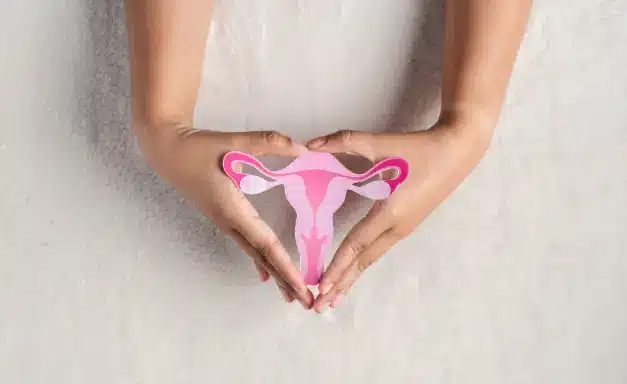Estrogen is a hormone that plays a vital role in regulating various processes in the female body, including the menstrual cycle and reproductive health. Excess estrogen levels can increase the risk of certain health conditions, while low levels may lead to symptoms such as irregular periods and hot flashes (source). This has made understanding the role of estrogen in medications an essential topic for healthcare providers and patients alike.
Nexplanon, a popular birth control implant, is often a topic of discussion when considering hormonal contraceptives. Patients frequently ask whether Nexplanon contains estrogen and how its hormone composition impacts the body and overall effectiveness.
In this article, we will explore whether Nexplanon has estrogen, its hormonal composition, and how it works as a contraceptive method.
Key Takeaways
- Nexplanon is a progestin-only contraceptive, meaning it does not contain estrogen.
- It releases the synthetic hormone etonogestrel, a progestin that prevents pregnancy.
- Since it lacks estrogen, women who are sensitive to estrogen can use Nexplanon without those specific side effects.
- The absence of estrogen doesn’t compromise its effectiveness, as it remains a highly reliable method of birth control.
- It’s a suitable choice for women who cannot or prefer not to use estrogen-based contraceptives, such as those with a history of blood clots.
About: Medical Spa RX provides medical practices with premium products at the best prices. If you’re looking to buy Nexplanon for your practice, the sales representatives at Medical Spa RX can give you guidance.
Understanding Nexplanon’s Hormonal Composition
Nexplanon is a small, flexible implant that releases the hormone etonogestrel, a synthetic form of progesterone. It works by preventing ovulation, thickening cervical mucus to block sperm, and thinning the uterine lining to reduce the likelihood of implantation.
Etonogestrel is absorbed slowly into the bloodstream, providing up to three years of effective contraception. The implant offers a highly reliable, low-maintenance birth control option for individuals who prefer not to take daily pills or use other methods like IUDs.
Nexplanon vs Estrogen-Containing Methods
Nexplanon and estrogen-containing methods like combined oral contraceptives (COCs) both prevent pregnancy, but they work differently. Nexplanon contains only progestin, while COCs combine progestin and estrogen. Here’s how they differ:

- Convenience: Nexplanon is a long-acting implant that works for up to 3 years after insertion, requiring no daily action. In contrast, COCs must be taken daily.
- Effectiveness: Nexplanon starts working immediately if inserted within the first 5 days of your period, whereas COCs take 7 days to become effective.
- Safety Considerations: COCs can increase the risk of blood clots and stroke, especially in specific individuals. Nexplanon, however, may not be suitable for those with a history of breast cancer or liver issues.
Both methods are highly effective at preventing pregnancy, with less than 1 in 100 women getting pregnant each year when used correctly.
Benefits of Progestin-Only Contraception
Progestin-only contraception, such as Nexplanon, offers several advantages for those seeking reliable birth control without estrogen. Here are some key benefits:
- Fewer Side Effects: Without estrogen, progestin-only methods are often preferred for individuals who experience negative side effects from estrogen-containing methods, such as headaches or nausea.
- Safety for Certain Health Conditions: It’s a good option for people with high blood pressure or a history of blood clots, as it doesn’t increase those risks.
- Convenience: Progestin-only methods, like implants or IUDs, provide long-term, low-maintenance contraception with no daily routine.
- Non-interfering with Breastfeeding: Progestin-only contraception is safe during breastfeeding, unlike estrogen-containing methods which can affect milk production.
These benefits make progestin-only options a flexible, effective, and safe choice, especially for those with specific health concerns or those who prefer long-term, low-maintenance contraception.
Suitability for Specific Patient Groups
Nexplanon is ideal for specific groups of women, offering safe, effective contraception with benefits tailored to unique health needs and preferences.

- Breastfeeding: Nexplanon is generally safe for breastfeeding mothers and has minimal impact on milk production. However, a small number of women might experience a slight decrease in milk supply.
- Blood clot risk: Nexplanon contains no estrogen, making it a safer option for women with a higher risk of blood clots or stroke.
- Long-term use: Nexplanon provides effective contraception for up to three years, requiring no daily attention.
- Weight gain: Studies show that weight gain is not a common side effect of Nexplanon.
- Periods: For many women, Nexplanon can stop periods altogether, which some may find advantageous.
- Side effects: Any Nexplanon side effects after removal are typically short-lived, with most women returning to their normal cycle quickly.
- Discreet: The tiny implant is placed under the skin, offering a discreet and private birth control method
Nexplanon is an excellent choice for many women, especially those with specific health needs or preferences for long-term, low-maintenance contraception.
Conclusion
Nexplanon is an estrogen-free, progestin-based implant that provides effective pregnancy prevention for up to three years. It is an excellent option for women who cannot use estrogen-based contraceptives, offering a convenient and long-lasting solution. Safe for use during breastfeeding and without impacting future fertility, Nexplanon stands out as a reliable and accessible choice for women seeking simple and effective contraception.
FAQs
1. How does Nexplanon work?
It prevents pregnancy by releasing progestin, which stops ovulation, thickens cervical mucus, and thins the uterine lining.
2. Is Nexplanon safe during breastfeeding?
Yes, Nexplanon is safe to use while breastfeeding and does not affect milk production for most women.
3. Can I remove Nexplanon anytime?
Yes, Nexplanon can be removed at any time by a healthcare provider, and fertility returns quickly.
4. Does Nexplanon affect future fertility?
No, once removed, fertility typically returns quickly, and there is no long-term impact on your ability to conceive.
References
What happens when estrogen levels are too high or too low? MedicineNet. https://www.medicinenet.com/what_happens_when_estrogen_levels_are_too_high/article.htmEstrogen: Hormone, Function, Levels & Imbalances. Cleveland Clinic. Published August 2, 2022. https://my.clevelandclinic.org/health/body/22353-estrogen



















